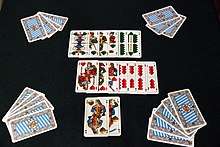Beggar-my-neighbour
Beggar-my-neighbour, also known as Strip Jack naked or Beat your neighbour out of doors[1], is a simple card game. It is somewhat similar in nature to the children's card game War, and has spawned a more complicated variant, Egyptian Ratscrew.
| Alternative names | Strip Jack naked, Beat your neighbour out of doors |
|---|---|
| Type | Adding-up-type |
| Players | 2+ [1] |
| Skills required | Counting |
| Cards | 52 |
| Deck | French |
| Play | Clockwise |
| Playing time | usually <15 minutes per hand |
| Random chance | Complete |
| Related games | |
| War, Egyptian Ratscrew | |
Origins
The game was probably invented in Britain and has been known there since at least the 1840s.[2]
It may be the same as Beat the Knave out of Doors or Knave out o' Doors, in which case it is much older as this game is mentioned as early as 1755.[3]
It appears in Charles Dickens's 1861 novel Great Expectations,[4] as the only card game Pip, the book's protagonist, seems to know how to play as a child.
Gameplay
A standard 52-card deck is divided equally between two players, and the two stacks of cards are placed on the table face down. The first player lays down their top card face up to start a central pile, and the opponent plays their top card, also face up, on it, and this goes on alternately as long as no Ace or court card (King, Queen, or Jack) appears. These cards are called "penalty cards."
If either player turns up such a card, their opponent has to pay a penalty: four cards for an Ace, three for a King, two for a Queen, or one for a Jack. They do this playing the required number of cards to the central pile. When they have done so, if all the cards are numerals, the player of the penalty card wins the hand, takes all the cards in the pile and places them under their pack. The game continues in the same fashion, the winner having the advantage of placing the first card. However, if the second player turns up another Ace or court card in the course of paying to the original penalty card, their payment ceases and the first player must pay to this new card. This changing of penalisation can continue indefinitely. When a single player has all of the cards in the deck in their stack, they have won.
For more than two players, play proceeds clockwise. If a player reveals a new penalty card while paying their penalty, the next player around pays the tax.[1]
Relation to mathematics
| Unsolved problem in mathematics: Is there a non-terminating game of beggar-my-neighbour? (more unsolved problems in mathematics) |
A longstanding question in combinatorial game theory asks whether there is a game of beggar-my-neighbour that goes on forever. This can happen only if the game is eventually periodic—that is, if it eventually reaches some state it has been in before. Some smaller decks of cards have infinite games, while others do not. John Conway once listed this among his anti-Hilbert problems,[5] open questions whose pursuit should emphatically not drive the future of mathematical research. The search for a non-terminating game has resulted in "longest known games" of increasing length.[6]
See also
Notes
- Beggar my neighbour, The Guardian, 22 Nov 2008
- ""his shop-boy, seated across an empty sugar-tub, was playing a game of 'Beggar-my-neighbor'" ''The Disgrace to the Family'' Chapter IV". Retrieved 2016-09-09.
- Smith 1755, p. 15.
- ""I played the game to an end with Estella, and she beggared me." ''Great Expectations'' Chapter 8". 19thnovels.com. Archived from the original on 2009-09-25. Retrieved 2009-10-29.
-
Guy, Richard K.; Nowakowski, Richard J. (25 November 2002). "Unsolved Problems in Combinatorial Games" (PDF). More Games of No Chance. MSRI Publications. 42. Cambridge University Press. ISBN 0521808324. Retrieved 2018-12-03.
This problem reappears periodically. It was one of Conway’s ‘anti-Hilbert problems’ about 40 years ago, but must have suggested itself to players of the game over the several centuries of its existence.
- Richard P Mann. "Known Historical Beggar-My-Neigbour Records". Retrieved 2018-12-03. As of 3 December 2018, none of these games continues indefinitely, the longest found being 1122 tricks / 7960 cards (William Rucklidge, 2014-03-05).
References
| Wikisource has the text of the 1911 Encyclopædia Britannica article Beggar-my-neighbour. |
- Marc Paulhus (1999). "Beggar My Neighbour". The American Mathematical Monthly. Mathematical Association of America. 106 (2): 162–165. doi:10.2307/2589054. JSTOR 2589054..
- Morehead, Albert H.; Frey, Richard L.; Mott-Smith, Geoffrey (1991). The New Complete Hoyle Revised: The Authoritative Guide to the Official Rules of all Popular Games of Skill and Chance. London, New York, Sydney, Auckland, Toronto: Doubleday. p. 456. ISBN 0-385-40270-8.
